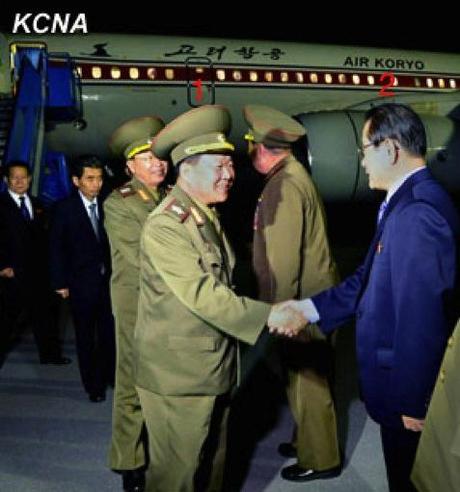
VMar Choe Ryong Hae (1) shakes hands with Kim Yong Il (2), Korean Workers’ Party Secretary and Director of the International Affairs Department, after arriving at Pyongyang Airport on 24 May 2013 from a three day visit to China (Photo: KCNA).
DPRK state media reported on 24 May (Friday) that VMar Choe Ryong Hae, Director of the Korean People’s Army [KPA] General Political Department and Member of the Korean Workers’ Party [KWP] Political Bureau Presidium, returned to the DPRK from a three-day visit to China as a “special envoy” of supreme leader Kim Jong Un (Kim Cho’ng-u’n). VMar Choe and a senior-level delegation which included Col. Gen. Ri Yong Gil (Chief of the KPA General Staff Operations Bureau), Kim Song Nam (Deputy Director of the KWP International Affairs Department), Kim Hyong Jun (Vice Minister of Foreign Affairs) and Lt. Gen. Kim Su Gil (Ministry of the People’s Armed Forces) landed in Pyongyang on Friday night. At the airport they were greeted by Gen. Kim Kyok Sik (Chief of the KPA General Staff), Col. Gen. Son Chol Ju (KPA General Political Department), Ri Yong Chol (Deputy Director of the KWP International Affairs Department), Pak Kil Yon (Vice Minister of Foreign Affairs and DPRK Ambassador-at-Large), Liu Hongcai (Chinese Ambassador to the DPRK) and other DPRK and Chinese officials.
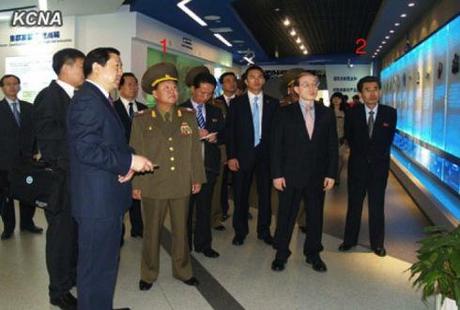
Choe Ryong Hae (1) tours the Beijing Economic and Technological Development Park. Also in attendance is Kim Song Nam (2), Deputy Director of the KWP International Affairs Department (Photo: KCNA).
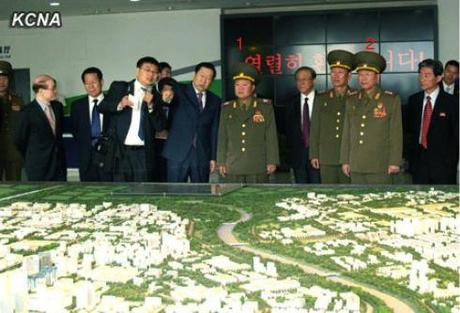
VMar Choe Ryong Hae (1), special envoy of Kim Jong Un, views a scale model of Beijing Economic and Technological Development Park. Also in attendance is Col. Gen. Gen. Ri Yong Gil (2), chief of the KPA General Staff Operations Bureau (Photo: KCNA).
After arriving in Beijing on 22 May (Wednesday), Choe Ryong Hae met with Wang Jiarui, head of the Communist Party of China [CPC] Central Committee International Liaison Department. On 23 May (Thursday), VMar Choe and the DPRK delegation, accompanied by Liu Jieyi, toured the Beijing Economic and Technological Development District. According to KCNA, Choe and the delegation were “greeted by a leading official of the district on the spot” and were “briefed on the history of the district and its management and operation.” Later on Thursday, VMar Choe and the delegation met with Liu Yunshan, the CPC’s propaganda [publicity] secretary and a member of the CPC Political Bureau Standing Committee (presidium). Liu “warmly welcomed the China visit by the special envoy of First Secretary Kim Jong Un, on behalf of the CPC Central Committee.”
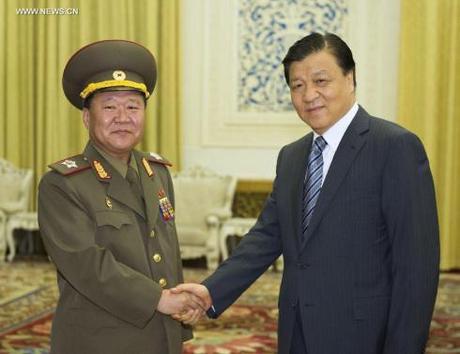
VMar Choe Ryong Hae (L), a special envoy of DPRK supreme leader Kim Jong Un, shakes hands with CPC Secretary Liu Yunshan (R) in Beijing on 23 May 2013 (Photo: Xinhua)
According to KCNA, during the meeting Choe Ryong Hae told Liu that “he came to China as a special envoy of the dear respected Kim Jong Un, adding that it is the invariable stand of the WPK to consolidate and develop generation after generation the DPRK-China friendship associated with the devoted efforts made by the leaders of the elder generation of the two parties and countries” and that the “DPRK will always advance hand in hand with the Chinese comrades to defend the socialist cause in the two countries and boost the friendship and solidarity between the two peoples, he noted, expressing hope that the CPC and the Chinese people would register greater successes in socialist construction with Chinese characteristics under the leadership of the CPC with Xi Jinping as its general secretary.” Liu Yunshan, according to KCNA, said that “the Chinese party and government deem it very important to steadily develop the China-DPRK friendly relations on a strategic level and from a long-term viewpoint,” that “the China visit by the special envoy is of weighty significance as it is taking place at a time when the Sino-DPRK relations have entered a new era of carrying forward the tradition and future, Liu said, stressing the need to boost the bilateral relations of friendship, a precious treasure common to the peoples of the two countries, down through generations” and that “the Chinese side hopes that the Sino-DPRK relations of friendship and cooperation will comprehensively grow stronger in political, economic, cultural and other fields as required by the new era.” KCNA also reported that ”both sides exchanged views on the situation of the Korean Peninsula and issues of mutual concern.”
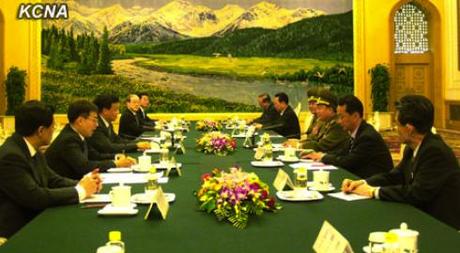
VMar Choe Ryong Hae and a senior-level DPRK delegation (R) meet with Liu Yunshan and senior CPC officials in Beijing on 23 May 2013 (Photo: KCNA)
According to Xinhua, Liu Yunshan “pointed out that peace and stability of the Korean Peninsula conform with the common interests of all countries in the region,” “expressed hope that all relevant parties should stick to the goal of denuclearization, persist on maintaining peace and stability of the peninsula and resolve problems through dialog and consultation,” “called for the parties to adopt substantial actions to ease tensions, actively embark on dialog and restart the six-party talks as soon as possible” and “urged the relevant parties to make unremitting effort to realize denuclearization of the peninsula and persistent peace and stability in the Northeast Asia region.” Choe Ryong Hae, according to Xinhua, said “the DPRK highly appreciated the effort that the Chinese side has made in maintaining peace and stability of the peninsula and on pushing the Korean Peninsula issue back on the track of dialog and consultation,” ”the DPRK hopes to concentrate its energy on developing its economy and improving people’s livelihood and is ready to create a peaceful external environment for this” and that “the DPRK side is willing to accept advice from the Chinese side and carry out dialog with relevant parties.” Liu Yunshan said “it is the consistent stance of the CPC and Chinese government to continuingly consolidate and develop friendly relations between the two countries” and “expressed the readiness to work with the DPRK side to enhance communication, increase common ground and advance China-DPRK relations in a healthy, stable way.” Choe remarked that “his visit as the special envoy of Kim is aimed to improve, consolidate and develop DPRK-China relations. He said the DPRK side is ready to work with the Chinese side to continuously push forward the development of bilateral relations.” After meeting with Choe Ryong Hae, Liu Yunshan hosted a reception for VMar Choe and the DPRK delegation.
Choe Ryong Hae’s meeting with Liu Yunshan was a topic of conversation at the daily news conference at the Chinese Foreign Ministry on 24 May. Asked about the Choe-Liu meeting, Foreign Ministry spokesman Hong Lei said “through the current visit, we hope to consolidate and develop China-DPRK relations, ease the current tensions on the Korean Peninsula, push for the denuclearization of the Korean Peninsula, maintain peace and stability on the Korean Peninsula, and promote the resolution of related issues through dialog and consultations.” Hong also expanded on Liu Yunshan’s remarks during his meeting with Choe saying that Liu “pointed out: eace and stability on the Korean Peninsula serve the common interests of countries in the region. It is hoped that the parties concerned will stick to the goal of denuclearizing the peninsula, remain committed to maintaining peace and stability on the peninsula and solving problems through dialog and consultations, take concrete action to ease tensions, actively pursue dialog and consultations, restart the Six-Party Talks as soon as possible, and make unremitting efforts to achieve the denuclearization of the peninsula as well as lasting peace and stability in Northeast Asia.”
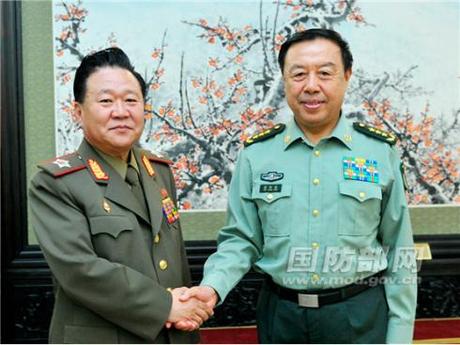
VMar Choe Ryong Hae (L), Director of the KPA General Political Department and Vice Chairman of the KWP Central Military Commission, shakes hands with Gen. Fan Changlong (R), Vice Chairman of the CPC Central Military Commission in Beijing on 24 May 2013 (Photo: PRC MOD)
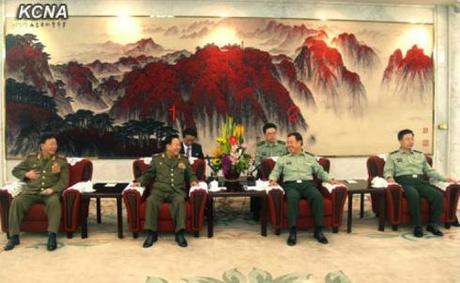
VMar Choe Ryong Hae (1), a special envoy of DPRK leader Kim Jong Un, talks with Gen. Fan Changlong (2), Vice Chairman of the CPC Central Military Commission during a meeting in Beijing on 24 May 2013 (Photo: KCNA)
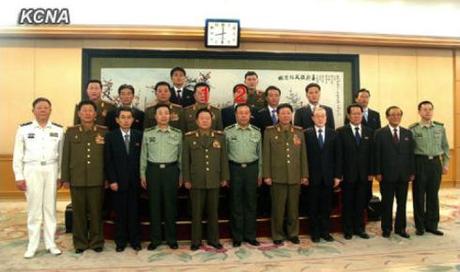
VMar Choe Ryong Hae (1) and a senior DPRK delegation pose for a commemorative photograph with CPC Central Military Commission Vice Chairman Gen. Fan Changlong (2) and senior PLA officials in Beijing on 24 May 2013 (Photo: KCNA)
On 24 May (Friday), Choe Ryong Hae and the DPRK delegation met with Gen. Fan Changlong, Member of the CPC Political Bureau and Vice Chairman of the CPC Central Military Commission. Gen. Fan “warmly welcomed the special envoy’s visit to China” and “noted that the two armies and peoples forged the militant friendship, fighting shoulder to shoulder in the same trench,” according to KCNA. Fan also said Choe’s visit “to China is of great significance in the development of the bilateral ties, he expressed the belief that the friendly and cooperative relations between the two parties, the two countries and the two armies would grow stronger on a new high stage.” VMar Choe told Gen. Fan “that the friendship between the DPRK and China was sealed in blood in the hard-fought battlefields including the anti-Japanese war, the war for liberating Northeast China and the Fatherland Liberation War, adding that it is an issue of particular importance in defending socialism in the two countries to boost the exchange and cooperation between the two armies” and “expressed the expectation that the two armies would play the role of a pioneer and vanguard in the development of the DPRK-China friendly ties in the future.” KCNA reported that “both sides exchanged views on the matters of boosting the friendly ties between the two armies.”
According to Xinhua, during the meeting, Gen. Fan Changlong told Choe Ryong Hae “China always holds the view that the peace and stability of the peninsula serves the common interests of all involved parties” and “expressed hope that the parties involved could stick to the denuclearization, safeguard peninsular peace and stability, resolve disputes and conflicts through dialogues and consultations, and make unremitting efforts for the realization of lasting peace and stability on the peninsula and in Northeast Asia.” VMar Choe, according to Xinhua, “highlighted the complicated the situation and lack of safety assurances on the Korean Peninsula and in Northeast Asia,” said that “ the DPRK people needs a stable and peaceful environment for the development of their country” and pledged that “the DPRK is willing to work with parties concerned to find ways to resolve the current conflicts via dialogues.”
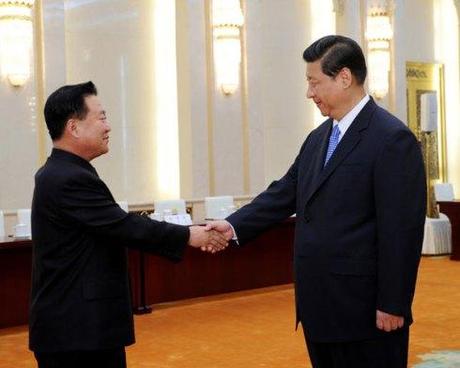
Chines President Xi Jinping (R) shakes hands with VMar Choe Ryong Hae, special envoy of DPRK leader Kim Jong Un, at the Great Hall of the People in Beijing on 24 May 2013 (Photo: Xinhua)
Later in the day on Friday, Choe Ryong Hae changed out of his KPA dress uniform into the black gakuran suit of senior party official to meet with Chinese President Xi Jinping at the Great Hall of the People. At the beginning of the meeting VMar Choe and President Xi exchanged civilities. Choe sent along Kim Jong Un’s greetings to Xi who “expressed deep thanks for this and asked Choe Ryong Hae to convey his cordial greetings to Kim Jong Un.” VMar Choe then passed along a private letter from Kim Jong Un to President Xi. According to KCNA, President Xi “expressed deep thanks once again to Kim Jong Un for dispatching Choe Ryong Hae as his special envoy and conveying his personal letter.” KCNA reported that in Kim Jong Un’s letter to Xi, KJU “underlined the need to carry forward and consolidate the traditional DPRK-China friendship provided and cultivated by the revolutionaries of the elder generation of the two countries, Xi Jinping said, noting that the Chinese party and government deem it very important to develop the Sino-DPRK friendly relations on a strategic level and from a long-term viewpoint and that it is the consistent policy of the Chinese party and government to inherit the tradition, face up to the future and strengthen cooperation.”
According to KCNA, Xi noted that “Chinese party and government hope for expanding the friendly exchange and cooperation with the party and government of the DPRK.” Xi also said “the Chinese party and government have consistently supported the building of a thriving socialist nation of Korean style. . .wishing the DPRK success in developing the economy and improving the standard of people’s living.” Choe Ryong Hae said “the DPRK and the PRC are friendly neighbors linked by the same mountain and rivers and their friendship has a long history and tradition. It is the invariable stand of the party and government of the DPRK to boost the long-standing traditional friendship between the DPRK and China.” VMar Choe also remarked that “the armies and peoples of the two countries know well that the DPRK-China friendship associated with the devoted efforts of the revolutionaries of the elder generation of the two countries is a precious one which cannot be exchanged for anything. . . expressing the belief that the traditional friendship would further flourish in the future under the particular care of the top leaders of the two parties and two countries” and “expressed hope that the Chinese people would realize ‘the dream of China’ and achieve bigger successes in accomplishing the socialist cause with Chinese characteristics under the leadership of the CPC with Xi Jinping as its general secretary.”
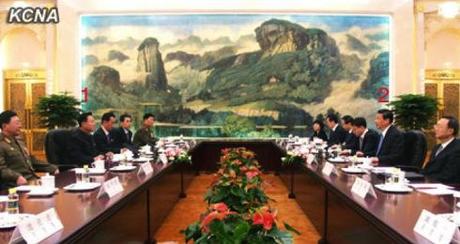
Choe Ryong Hae (1) and a senior DPRK delegation meet with Chinese President Xi Jinping (2) and senior Chinese officials at the Great Hall of the People in Beijing on 24 May 2013 (Photo: KCNA)
Xinhua reported that Xi Jinping told Choe that “China has a very clear position concerning the issue that all the parties involved should stick to the objective of denuclearization, safeguard the peace and stability on the peninsula, and resolve disputes through dialog and consultation” and President Xi “called on all parties concerned to remain calm and with restraint, ease the situation and restart the process of the six-party talks, in a bid to achieve denuclearization on the Korean Peninsula and safeguard peace and stability in Northeast Asia.” According to Xinhua Choe Ryong Hae said “it is the sincere wish of the DPRK to create a peaceful external environment to develop its economy and improve people’s livelihood” and that “the DPRK is ready to work with parties concerned to properly solve relevant issues through multiform dialog and consultation, including the six-party talks” and “willing to adopt active moves to safeguard peace and stability on the Korean Peninsula.” Xi also noted to Choe that “bilateral friendship conforms to the common interests of the two countries as well as their people,” and that “the Communist Party of China and the Chinese government will make joint efforts with the DPRK to promote the sound and stable development of bilateral relations.” Choe told Xi that the “DPRK values its traditional friendship with China, said Choe, adding that the DPRK will work with China to beef up high-level exchanges and in-depth communication, so as to constantly consolidate and develop their friendship.”
Filed under: 12 February 2013 Nuclear Test, 2013 Strategic Rhetoric, Administration Department, Central Committee, Central Military Committee, central party life, Choe Ryong Hae, cpc-kwp rels, DPRK Cabinet, DPRK Diplomat Corps, DPRK External Relations, DPRK Intelligence Community, DPRK-China Relations, Gen. Kim Kyok Sik, gsd, gsob, Guard Command, Ji Jae Ryong, Kim Family, Kim Jong-un, Kim Song Nam (IAD), Kim Yong Il (IAD), KJI Personal Secretariat, Korean People's Army (KPA), Korean Workers' Party (KWP), KPA External Relations, KPA General Political Bureau, KPA General Political Department, KPA General Staff, KPA-PLA relations, Lt. Gen. Ri Yong Gil, Mangyo'ngdae Revolutionary School Alumni, May 2013 Choe Ryong Hae Beijing Visit, military security command [msc], Ministry of Foreign Affairs, Ministry of State Security, Ministry of the People's Armed Forces (MPAF), MPAF GPB, National Defense Commission (NDC), NDC Administration Department, North Korean press, Organization and Guidance Department, Political Bureau, Propaganda and Agitation Department, Secretariat, Six Party Talks, State Security Department, Third Floor
